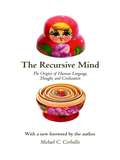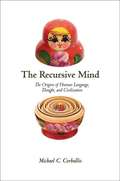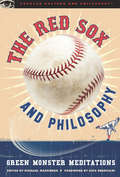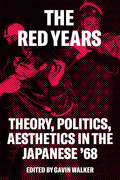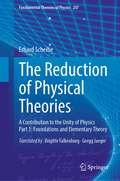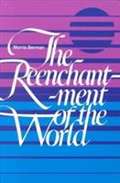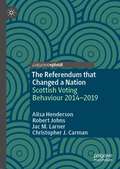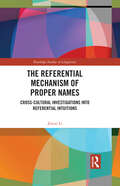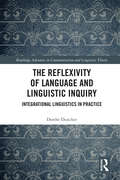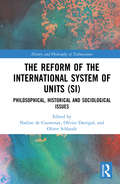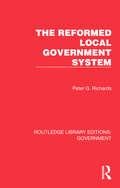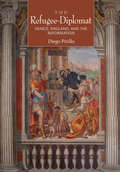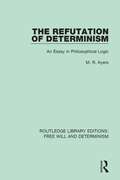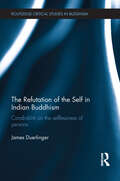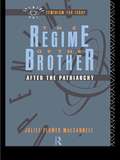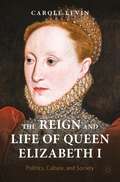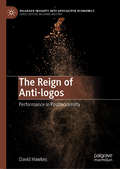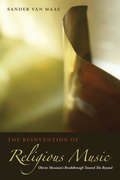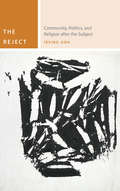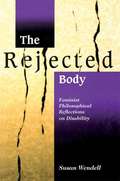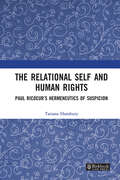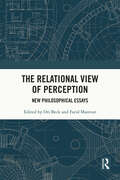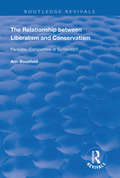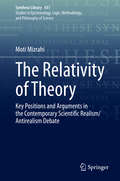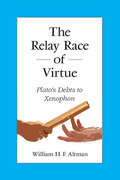- Table View
- List View
The Recursive Mind
by Michael C. CorballisThe Recursive Mind challenges the commonly held notion that language is what makes us uniquely human. In this compelling book, Michael Corballis argues that what distinguishes us in the animal kingdom is our capacity for recursion: the ability to embed our thoughts within other thoughts. "I think, therefore I am," is an example of recursive thought, because the thinker has inserted himself into his thought. Recursion enables us to conceive of our own minds and the minds of others. It also gives us the power of mental "time travel"--the ability to insert past experiences, or imagined future ones, into present consciousness. Drawing on neuroscience, psychology, animal behavior, anthropology, and archaeology, Corballis demonstrates how these recursive structures led to the emergence of language and speech, which ultimately enabled us to share our thoughts, plan with others, and reshape our environment to better reflect our creative imaginations. He shows how the recursive mind was critical to survival in the harsh conditions of the Pleistocene epoch, and how it evolved to foster social cohesion. He traces how language itself adapted to recursive thinking, first through manual gestures, then later, with the emergence of Homo sapiens, vocally. Toolmaking and manufacture arose, and the application of recursive principles to these activities in turn led to the complexities of human civilization, the extinction of fellow large-brained hominins like the Neandertals, and our species' supremacy over the physical world.Some images inside the book are unavailable due to digital copyright restrictions.
The Recursive Mind: The Origins of Human Language, Thought, and Civilization
by Michael C. CorballisThe Recursive Mind challenges the commonly held notion that language is what makes us uniquely human. In this compelling book, Michael Corballis argues that what distinguishes us in the animal kingdom is our capacity for recursion: the ability to embed our thoughts within other thoughts. "I think, therefore I am," is an example of recursive thought, because the thinker has inserted himself into his thought. Recursion enables us to conceive of our own minds and the minds of others. It also gives us the power of mental "time travel"--the ability to insert past experiences, or imagined future ones, into present consciousness.Drawing on neuroscience, psychology, animal behavior, anthropology, and archaeology, Corballis demonstrates how these recursive structures led to the emergence of language and speech, which ultimately enabled us to share our thoughts, plan with others, and reshape our environment to better reflect our creative imaginations. He shows how the recursive mind was critical to survival in the harsh conditions of the Pleistocene epoch, and how it evolved to foster social cohesion. He traces how language itself adapted to recursive thinking, first through manual gestures, then later, with the emergence of Homo sapiens, vocally. Toolmaking and manufacture arose, and the application of recursive principles to these activities in turn led to the complexities of human civilization, the extinction of fellow large-brained hominins like the Neandertals, and our species' supremacy over the physical world.
The Red Sox and Philosophy
by Michael MacomberThis volume in the Popular Culture and Philosophy series delves into the tragic and redemptive history of the Boston Red Sox baseball franchise. Drawing on philosophers from Aristotle to Sartre, chapters range from issues of faith and spirituality to tragedy, irony, existentialism, Sabermetrics, and the infamous "curse of the Bambino." With an emphasis on "Red Sox Nation" - the community of Red Sox fans across the globe - the book connects important philosophical ideas with one of the most storied teams in the history of Major League Baseball. The chapters make complex philosophical arguments easy to understand while providing an insider's knowledge of the hometown team. All but one of the authors in this volume are all Red Sox fans who comment on their team philosophically. There's even a Yankee fan's perspective! With a foreword by Dick Bresciani, vice president and official historian of the Boston Red Sox, this book provides a unique philosophical experience for the die-hard Red Sox fan.
The Red Years: Theory, Politics, and Aesthetics in the Japanese '68
by Gavin WalkerJapan: The "other," lesser-known 1968The analysis of May 68 in Paris, Berkeley, and the Western world has been widely reconsidered. But 1968 is not only a year that conjures up images of Paris, Frankfurt, or Milan: it is also the pivotal year for a new anti-colonial and anti-capitalist politicsto erupt across the Third World, a crucial and central moment in the history, thought, and politics of Asia, Africa, the Middle East, and Latin America. Japan's position -- neither in "the West" nor in the "Third World" --provoked a complex and intense round of mass mobilizations through the 1960s and early 70s. Although the "'68 revolutions" of the Global North -- Western Europe and North America -- are widely known, the Japanese situation remains remarkably under-examined globally. Beginning in the late 1950s, a New Left, independent of the prewar Japanese communist moment (itself of major historical importance in the 1920s and 30s), came to produce one of the most vibrant decades of political organization, political thought, and political aesthetics in the global twentieth century. In the present volume, major thinkers of the Left in Japan alongside scholars of the 1968 movements reexamine the theoretical sources, historical background, cultural productions, and major organizational problems of the 1968 revolutions in Japan.
The Reduction of Physical Theories: A Contribution to the Unity of Physics Part 1: Foundations and Elementary Theory (Fundamental Theories of Physics #207)
by Erhard ScheibeUsing simple physical examples, this work by Erhard Scheibe presents an important and powerful approach to the reduction of physical theories. Novel to the approach is that it is not based, as usual, on a single reduction concept that is fixed once and for all, but on a series of recursively constructed reductions, with which all reductions appear as combinations of very specific elementary reductions. This leaves the general notion of theory reduction initially open and is beneficial for the treatment of the difficult cases of reduction from the fields of special and general relativity, thermodynamics, statistical mechanics,and quantum mechanics, which are treated in the second volume. The book is systematically organized and intended for readers interested in philosophy of science as well as physicists without deep philosophical knowledge.
The Reenchantment of the World
by Morris BermanThe author in the book assesses the essential problem or dysfunctionality of the Cartesian approach to the world, and suggests that a "re-enchantment" of the world is needed.
The Referendum that Changed a Nation: Scottish Voting Behaviour 2014–2019
by Robert Johns Ailsa Henderson Christopher J. Carman Jac M. LarnerDrawing on data from the Scottish Referendum Study and subsequent Scottish Election Studies, this book provides the first in depth analysis of how voters engaged with the independence referendum in 2014 and what impact this has had on vote choice, polarisation and engagement in Scotland since then. The book contains eight chapters, and discusses how voters engaged with the referendum campaign, explains vote choice by examining reactions to the cues of parties, leaders and events, and compares the importance of these to calculations about risk.
The Referential Mechanism of Proper Names: Cross-cultural Investigations into Referential Intuitions (Routledge Studies in Linguistics)
by Jincai LiEach of us bears a unique name given to us at birth. When people use your name, they typically refer to you. But what is the linkage that ties a name to a person and hence allows it to refer? Li’s book approaches this question of reference empirically through the medium of referential intuitions. Building on the literature on philosophical and linguistic intuitions, she proposes a linguistic-competence-based account of referential intuitions. Subsequently, using a series of novel experiments, she investigates the variation of referential intuitions across different cultures, as well as the developmental trajectory and the underlying causes of the observed cultural differences. What she finds is that the cultural patterns of referential intuitions are already in place around age seven, and the differences are largely attributable to the distinct perspective taking strategies favoured by easterners and westerners, rather than the moral valence of actions involved in the experimental materials. These results are taken to better support referential pluralism (in particular, the ambiguous view) than referential monism. By undertaking this fascinating research, Li’s book provides new insights into the cognitive mechanisms underlying people’s referential usage of names. It will be valuable to students and scholars of linguistics, philosophy of language and experimental philosophy, and in particular, to those who research into semantic intuitions and theories of reference.
The Reflexivity of Language and Linguistic Inquiry: Integrational Linguistics in Practice (Routledge Advances in Communication and Linguistic Theory)
by Dorthe DunckerThis book explores the reflexivity of language both from the perspective of the lay speaker and the linguistic analyst. Linguistic inquiry is conditional upon linguistic reflexivity, but so is language. Without linguistic reflexivity, we would not be able to make sense of everyday linguistic communication, and the idea of a language would not be conceivable. Not even fundamental notions such as words or meaning would exist. Linguistic reflexivity is a feature of the communication process, and it essentially depends on situated participants and time. It is a defining characteristic of the human language but despite its obvious importance, it is not very well understood theoretically, and it is strangely under-researched empirically. Throughout history and in modern linguistics, it has mostly either been taken for granted, misconstrued, or ignored. Only integrational linguistics fully recognizes its specifically linguistic implications. However, integrational linguistics does not provide the necessary methodological basis for investigating linguistic phenomena empirically. This catch-22 situation means that the goal of the book is twofold: one part is to explore the reflexivity of language theoretically, and the other part is to propose an applied integrational linguistics and to implement this proposal in practice.
The Reform of the International System of Units: Philosophical, Historical and Sociological Issues (History and Philosophy of Technoscience)
by Olivier Darrigol Oliver Schlaudt Nadine CourtenaySystems of units still fail to attract the philosophical attention they deserve, but this could change with the current reform of the International System of Units (SI). Most of the SI base units will henceforth be based on certain laws of nature and a choice of fundamental constants whose values will be frozen. The theoretical, experimental and institutional work required to implement the reform highlights the entanglement of scientific, technological and social features in scientific enterprise, while it also invites a philosophical inquiry that promises to overcome the tensions that have long obstructed science studies.
The Reformed Local Government System (Routledge Library Editions: Government)
by Peter G. RichardsOriginally published in 1973 and revised as a third edition in 1978, this book provides a concise introductory account of the system of local administration since the Local Government Act of 1972 produced the most-far-reaching change in England and Wales since 1888. The book shows why such a major shake-up was necessary, and how the policies evolved which produced the new pattern of local authorities. The book contains basic factual material about the constitution and powers of the new councils and discusses the major problems which confront them. It also considers the respective roles of councillors officials and the political circumstances within which local government has to work.
The Refugee-Diplomat: Venice, England, and the Reformation
by Diego PirilloThe establishment of permanent embassies in fifteenth-century Italy has traditionally been regarded as the moment of transition between medieval and modern diplomacy. In The Refugee-Diplomat, Diego Pirillo offers an alternative history of early modern diplomacy, centered not on states and their official representatives but around the figure of "the refugee-diplomat" and, more specifically, Italian religious dissidents who forged ties with English and northern European Protestants in the hope of inspiring an Italian Reformation.Pirillo reconsiders how diplomacy worked, not only within but also outside of formal state channels, through underground networks of individuals who were able to move across confessional and linguistic borders, often adapting their own identities to the changing political conditions they encountered. Through a trove of diplomatic and mercantile letters, inquisitorial records, literary texts, marginalia, and visual material, The Refugee-Diplomat recovers the agency of religious refugees in international affairs, revealing their profound impact on the emergence of early modern diplomatic culture and practice.
The Refutation of Determinism: An Essay in Philosophical Logic (Routledge Library Editions: Free Will and Determinism #10)
by M.R. AyersPerhaps everyone who can think has the concept of possibility, but no one understands it. The metaphysical theory of Determinism is a symptom of this lack of understanding, and the inconclusiveness of its opponents’ arguments indicates that the lack is universal. In this book, first published in 1968, the author shows that there are a number of different kinds on non-logical possibility, subtly interrelated, each requiring separate explanation. An original contribution to the subject, it is essential reading for all students of philosophy.
The Refutation of the Self in Indian Buddhism: Candrakīrti on the Selflessness of Persons (Routledge Critical Studies in Buddhism)
by James DuerlingerSince the Buddha did not fully explain the theory of persons that underlies his teaching, in later centuries a number of different interpretations were developed. This book presents the interpretation by the celebrated Indian Buddhist philosopher, Candrakīrti (ca. 570–650 C.E.). Candrakīrti’s fullest statement of the theory is included in his Autocommentary on the Introduction to the Middle Way (Madhyamakāvatārabhasya), which is, along with his Introduction to the Middle Way (Madhyamakāvatāra ), among the central treatises that present the Prāsavgika account of the Madhyamaka (Middle Way) philosophy. In this book, Candrakīrti’s most complete statement of his theory of persons is translated and provided with an introduction and commentary that present a careful philosophical analysis of Candrakīrti’s account of the selflessness of persons. This analysis is both philologically precise and analytically sophisticated. The book is of interest to scholars of Buddhism generally and especially to scholars of Indian Buddhist philosophy.
The Regime of the Brother: After the Patriarchy (Opening Out: Feminism for Today)
by Juliet Flower MacCannellThe Regime of the Brother is one of the first attempts to challenge modernity on its own terms. Using the work of Lacan, Kristeva and Freud, Juliet MacCannell confronts the failure of modernity to bring about the social equality promised by the Enlightenment. On the verge of its destruction, the Patriarchy has reshaped itself into a new, and often more oppressive regime: that of the Brother. Examining a range of literary and social texts - from Rousseau's Confessions to Richardson's Clarissa and from Stendhal's De L'Amour to James's What Maisie Knew and Jean Rhys's Wide Sargasso Sea - MacCannell illustrates a history of the suppression of women, revealing the potential for a specifically feminine alternative.
The Reign and Life of Queen Elizabeth I: Politics, Culture, and Society (Queenship and Power)
by Carole LevinThis textbook provides an overview of the long reign of Elizabeth I (1558–1603), a highly significant female ruler in a time of great change. It offers an accessible yet detailed survey of the events of her life and reign, followed by thematic chapters exploring key aspects of her time in power and the wider context of politics, culture and society in early modern England. Topics covered range from the composition of the queen's Privy Council; the 'Other' in Elizabethan England; assassination attempts; friendship; entertainment; and dreams. Gathering a great deal of cutting-edge and original research from one of the foremost scholars of Elizabeth's reign, this book is an essential companion for students and a crucial reference work for researchers.
The Reign of Anti-logos: Performance in Postmodernity (Palgrave Insights into Apocalypse Economics)
by David HawkesThe concept of ‘performativity’ has risen to prominence throughout the humanities. The rise of financial derivatives reflects the power of the performative sign in the economic sphere. As recent debates about gender identity show, the concept of performativity is also profoundly influential on people’s personal lives. Although the autonomous power of representation has been studied in disciplines ranging from economics to poetics, however, it has not yet been evaluated in ethical terms. This book supplies that deficiency, providing an ethical critique of performative representation as it is manifested in semiotics, linguistics, philosophy, poetics, theology and economics. It constructs a moral criticism of the performative sign in two ways: first, by identifying its rise to power as a single phenomenon manifested in various different areas; and second, by locating efficacious representation in its historical context, thus connecting it to idolatry, magic, usury and similar performative signs. The book concludes by suggesting that earlier ethical critiques of efficacious representation might be revived in our own postmodern era.
The Reinvention of Religious Music: Olivier Messiaen's Breakthrough Toward the Beyond
by Sander van MaasOn the basis of a careful analysis of Olivier Messiaen's work, this book argues for a renewal of our thinking about religious music. Addressing his notion of a "hyper-religious" music of sounds and colors, it aims to show that Messiaen has broken new ground. His reinvention of religious music makes us again aware of the fact that religious music, if taken in its proper radical sense, belongs to the foremost of musical adventures.The work of Olivier Messiaen is well known for its inclusion of religious themes and gestures. These alone, however, do not seem enough to account for the religious status of the work. Arguing for a "breakthrough toward the beyond" on the basis of the synaesthetic experience of music, Messiaen invites a confrontation with contemporary theologians and post-secular thinkers. How to account for a religious breakthrough that is produced by a work of art?Starting from an analysis of his 1960s oratorio La Transfiguration de Notre-Seigneur Jésus-Christ, this book arranges a moderated dialogue between Messiaen and the music theology of Hans Urs von Balthasar, the phenomenology of revelation of Jean-Luc Marion, the rethinking of religion and technics in Jacques Derrida and Bernard Stiegler, and the Augustinian ruminations of Søren Kierkegaard and Jean-François Lyotard. Ultimately, this confrontation underscores the challenging yet deeply affirmative nature of Messiaen's music.
The Reject: Community, Politics, and Religion after the Subject (Commonalities)
by Irving GohThis book proposes a theory of the reject, a more adequate figure than the subject for thinking friendship, love, community, democracy, the postsecular, and the posthuman.Through close readings of Nancy, Deleuze, Derrida, Cixous, Clement, Bataille, Balibar, Ranciere, and Badiou, Goh shows how the reject has always been nascent in contemporary French thought. The recent turn to animals and bare life, as well as the rise of the Occupy movement, he argues, presents a special urgency to think the reject today.Thinking the reject most importantly helps to advance our commitment to affirm others without acculturating their differences. But the reject also offers, Goh proposes, a response finally commensurate with the radical horizon of Nancy’s question of who comes after the subject.
The Rejected Body: Feminist Philosophical Reflections on Disability
by Susan WendellThe Rejected Body argues that feminist theorizing has been skewed toward non-disabled experience, and that the knowledge of people with disabilities must be integrated into feminist ethics, discussions of bodily life, and criticism of the cognitive and social authority of medicine. Among the topics it addresses are who should be identified as disabled; whether disability is biomedical, social or both; what causes disability and what could 'cure' it; and whether scientific efforts to eliminate disabling physical conditions are morally justified. Wendell provides a remarkable look at how cultural attitudes towards the body contribute to the stigma of disability and to widespread unwillingness to accept and provide for the body's inevitable weakness.
The Relational Self and Human Rights: Paul Ricoeur’s Hermeneutics of Suspicion
by Tatiana HansburyThis book takes up Paul Ricoeur’s relational idea of the self in order to rethink the basis of human rights. Many schools of critical theory argue that the idea of human rights is based on a problematic conception of the human subject and the legal person. For liberals, the human is a possessive and self-interested individual, such that others are either tools or hurdles in their projects. This book offers a novel reading of subjectivity and rights based on Paul Ricœur’s re-interpretation of human subjectivity as a relational concept. Taking up Ricoeur’s idea of recognition as a ‘reciprocal gift’, it argues that gift exchange is the relation upon which authentic, non-abstract, human subjectivity is based. Seen in this context, human rights can be understood as tokens of mutual recognition, securing a genuinely human life for all. The conception of human rights as gift effectively counters their moral individualism and possessiveness, as the philosophical anthropology of an isolated ego is replaced by that of a related, dependent and embedded self. This original reinterpretation of human rights will appeal to scholars of legal theory, jurisprudence, politics and philosophy.
The Relational View of Perception: New Philosophical Essays
by Ori Beck Farid MasrourRelationalism is the view in philosophy of mind that particulars in our environment are constituents of conscious perception. It is an important theory of perceptual experience, offering explanations of perception's phenomenal character and its epistemic and semantic role. However, it has also been criticised for a lack of empirical grounding.In this outstanding collection, an international team of contributors examine relationalism and consider its role in philosophy of mind and perception across four key areas: The significance of empirical evidence to the theory of relationalism Dependence of experience on the subject’s internal makeup Hallucinations and the unity of perceptual experience Relationalism and empirical knowledge. The Relational View of Perception: New Philosophical Essays will be of great interest to advanced students and scholars in philosophy of mind.Contributors: Dominic Alford-Duguid, Rami Ali, Ori Beck, Alex Byrne, Elijah Chudnoff, Peter Epstein, Craig French, E. J. Green, Roberta Locatelli, Heather Logue, Farid Masrour, Alva Noë, Adam Pautz, Ian Phillips, Thomas Raleigh, Susanna Schellenberg, Umrao Sethi, Matthew Soteriou, and Lisa Titus.
The Relationship between Liberalism and Conservatism: Parasitic, Competitive or Symbiotic? (Routledge Revivals)
by Ann BousfieldFirst published in 1999, this volume is a radical text which contributes to the current debate over the future of liberal theory as it offers an explicit critique of some of the leading players in that debate - namely William Galston, Jeffrey Reiman and Richard Rorty. It also offers an implicit critique of the general de-ontological liberal position.
The Relativity of Theory: Key Positions and Arguments in the Contemporary Scientific Realism/Antirealism Debate (Synthese Library #431)
by Moti MizrahiThis book offers a close and rigorous examination of the arguments for and against scientific realism and introduces key positions in the scientific realism/antirealism debate, which is one of the central debates in contemporary philosophy of science. On the one hand, scientific realists argue that we have good reasons to believe that our best scientific theories are approximately true because, if they were not even approximately true, they would not be able to explain and predict natural phenomena with such impressive accuracy. On the other hand, antirealists argue that the success of science does not warrant belief in the approximate truth of our best scientific theories. This is because the history of science is a graveyard of theories that were once successful but were later discarded. The author eventually settles on a middle-ground position between scientific realism and antirealism called “relative realism”.
The Relay Race of Virtue: Plato's Debts to Xenophon (SUNY series in Ancient Greek Philosophy)
by William H. AltmanThe ancient view that Plato and Xenophon were rivals at least had the merit of allowing them to respond to each other; in modern times, the view that Plato wrote first eliminates the possibility of an exchange between the only two Socratics whose writings are preserved intact. Challenging the chronological assumptions on which Plato's across-the-board priority currently rests, the purpose of The Relay Race of Virtue is to show that Plato and Xenophon were responding to each other and that we can gain a greater appreciation for both by recognizing the back-and-forth nature of their friendly dialogue. Instead of regarding Xenophon as Plato's inept copyist, William H. F. Altman presents him as first blazing the trail for his fellow Socratic and then learning from Plato in return. By emphasizing "Plato's Debts to Xenophon," Altman is charitable to both, justifying Socrates' belief (Memorabilia 1.2.8) "that those of his companions who adopted his principles of conduct would throughout life be good friends to him and to each other."
